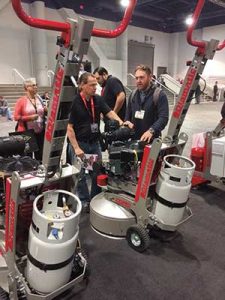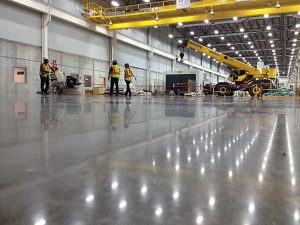Cementing increased propane sales in the concrete market
Depending on the amount of finishing provided, a given slab of concrete can serve as a rough pad surrounding a barbecue grill in the backyard or a stunningly exquisite lobby floor in a luxury hotel.
Whirling trowels, gyrating gemstones, bouncing steel balls and vibrating blades are among the concrete surfacing technologies being applied by an array of walk-behind, ride-on and remote-controlled machines.
Diamond-encrusted grinding wheels and an assortment of sanding discs are put to work in varying stages of ruggedness, much like refinishing a wooden floor.
Having long been the domain of diesel, gasoline, electrical and battery motors, these lines of equipment utilized by concrete contractors to achieve their desired levels of surfacing are increasingly becoming powered by propane.
Propane marketers who pursue the concrete construction and renovation segment can cement yearlong sales – especially those valued summer loads, according to Jeremy Wishart, deputy director of business development at the Propane Education & Research Council (PERC).
“Propane-powered concrete trowels have been in the market for quite some time,” he says. “However, propane-powered concrete polishers, saws and grinders are relatively new products that have been added to many manufacturers’ model lineups based on demand from concrete professionals.”
In addition to direct contact with contractors, propane marketers can form alliances with construction tool rental outlets, along with equipment distributors and manufacturers. Converting fume-spewing diesel and gasoline engines to run on propane is another potential profit center.
“No other alternative fuel can accomplish what propane can do,” Wishart says. “There’s an opportunity. We want to show the contractors and manufacturers what propane can do for them.”
Builders and equipment suppliers alike can benefit from doing away with excessive exhaust emissions, fuel storage dangers and degradation issues, bulky extension cords and battery range limitations.
As Wishart was traversing the miles of aisles at January’s World of Concrete exposition in Las Vegas, he came across more than 25 manufacturers displaying propane-powered machines. Numerous other specialized manufacturers, frequently family-owned smaller businesses, are located throughout the country. The devices are primarily designed for concrete finishing and maintenance tasks in indoor and semi-indoor environments, such as warehouses, retail stores, office buildings, apartments and resorts.
Propane units are applied to restoration projects at existing structures, as well, removing tile and carpet adhesives for new-covering preparation or buffing, all the way up to an attractive standalone gleaming sheen.
World of Concrete exhibitors were intrigued with the prospect of furthering propane’s presence in the industry.
“The first time I went a couple of years ago it was, ‘Oh wow, I didn’t even know there was a propane association,’” Wishart recounts. “It’s in the best interest of both sides. We want to sell more propane and they want to sell more equipment.”
PERC’s main role for now, Wishart continues, “is building awareness and educating the propane industry on the ins-and-outs of the concrete finishing and light-duty construction market. The methods of selling into other cylinder-based engine fuel markets, such as mowers and forklifts, all apply to this market. However, defining the market and laying out the opportunity is what we need to do.”
Serving the market
The nature of how concrete and light-duty construction contractors operate and seek out their fuel options opens new avenues for propane that can be mutually beneficial to both markets, according to Wishart.
“Ultimately PERC’s goal is to increase the adoption – purchase – of propane-powered equipment in this market,” he says. “However, the immediate goals are more centered on building internal and external product awareness and education pertaining to propane as a safe, reliable and efficient fuel for the concrete market.”
Propane equipment is mostly put to use for larger-scale “blow-out renovations” and substantial new construction projects as with good-sized structures, corporate campuses and neighborhood-sized housing developments. Concrete highways are usually poured and finished via massive machines fueled by diesel and gasoline.
“It’s not something you would see a regular homebuilder use,” Wishart says of the propane units. “Those guys are typically doing a lot more work by hand because it’s simpler and faster.”
Although individual garage, driveway and patio installations may be accomplished economically with hand tools, motorized LP gas equipment can be rented to complete more ambitious applications.
“Partner up with an equipment distributor or a rental business,” Wishart suggests. “You can say, ‘I’m your fuel expert,’ kind of like with the commercial mower market.”
In reaching out directly to builders in your community, Wishart says, find out what types of construction projects are going on and which contractors are working on them.
You can cold call or visit a job site in person to pitch propane’s possibilities.
“The first step a marketer should take to begin serving this market is to make sure your contact information and details are up-to-date on the Find a Propane Retailer (FPR) tool that PERC offers,” Wishart says.
On their FPR account profile, propane retailers can select “cylinder exchange,” “refilling” or other specific markets they serve.
“The FPR tool is a starting point for a potential customer, thus having the most up-to-date information on your company’s profile is extremely important,” he says. “FPR serves to be that vital link between those customers looking to buy propane and those marketers looking to serve the concrete and construction market.”
Because the vast majority of the propane equipment relies on exchangeable cylinders, “Most marketers likely already have a significant number of forklift and, perhaps, mower cylinders in their service network at present. So offering fuel to this market requires very little, if any, new capital investment in equipment or sales staff/approach,” Wishart says.
Wishart notes, however, that forklift and mower cylinders are not interchangeable on a given machine, and it’s not advisable to simply change valves on the machine or cylinder. Make sure you know which type of cylinder is required for the equipment being utilized, he adds.

PERC’s Jesse Marcus, right, visits with a Diamatic representative at World of Concrete in Las Vegas. Photo by Jeremy Wishart/Propane Education & Research Council
The key selling points for the concrete industry are much the same as those directed at the commercial mower market, according to PERC:
■ Reduced emissions (up to 15 percent greenhouse gas emissions reduction and up to 40 percent carbon monoxide emissions reduction)
■ On some construction sites, gasoline and diesel usage may be prohibited due to local code or specific site regulations.
■ Both environmental and employee health benefits can be realized in terms of equipment operation.
■ Reduced cost of operation (Although there is nothing specific yet regarding propane-fueled concrete equipment figures, looking at allied markets would suggest up to a 30 percent reduction in fuel costs compared to gasoline and/or diesel.)
■ Fuel stability (No ethanol in propane means no fuel degradation or fuel system clogging and warranty issues if equipment is stored for long periods of time.)
■ Fuel security/theft (People are less likely to simply walk off job sites with propane cylinders as they are with gasoline containers.)
■ Significantly reduced fuel spillage
Operators report that propane is simply easier to use when compared to electric concrete polishing equipment for several reasons, Wishart says:
■ Electricity is not always readily available on construction sites.
■ Propane does not require external generators to operate on-site. (Operators would need to rent a generator suitable for these projects and haul the fuel, which further drives up the cost.)
■ Electric cords used to power electric polishers and grinders are hard to carry and manage while operating the equipment, and they can be easily damaged during use.
“Propane trowels, grinders and polishers can often be used indoors, provided there is adequate ventilation,” Wishart explains. “For example, a contractor would likely use a propane-powered polisher or trowel in a new construction setting where airflow is a non-issue. However, in a remodel of a tightly enclosed space, they’ll utilize an electric polisher and an appropriate dust-management system.”
A propane cylinder can be stored indefinitely at a contractor’s headquarters, provided it’s done so in a safe manner in accordance with local code/regulations, Wishart notes.
The propane cylinder is also part of a closed system, so unlike gasoline or diesel the fuel does not degrade or attract moisture over time that will ultimately damage the fuel system and engine internals.
“I’ve seen an ebb and flow” in the construction marketplace based on the nation’s overall economics, says Wishart, adding that “it’s on an upswing now” and ready for propane marketers to leverage the category.
More: Manufacturers rolling out propane-fueled equipment for concrete contractors


















